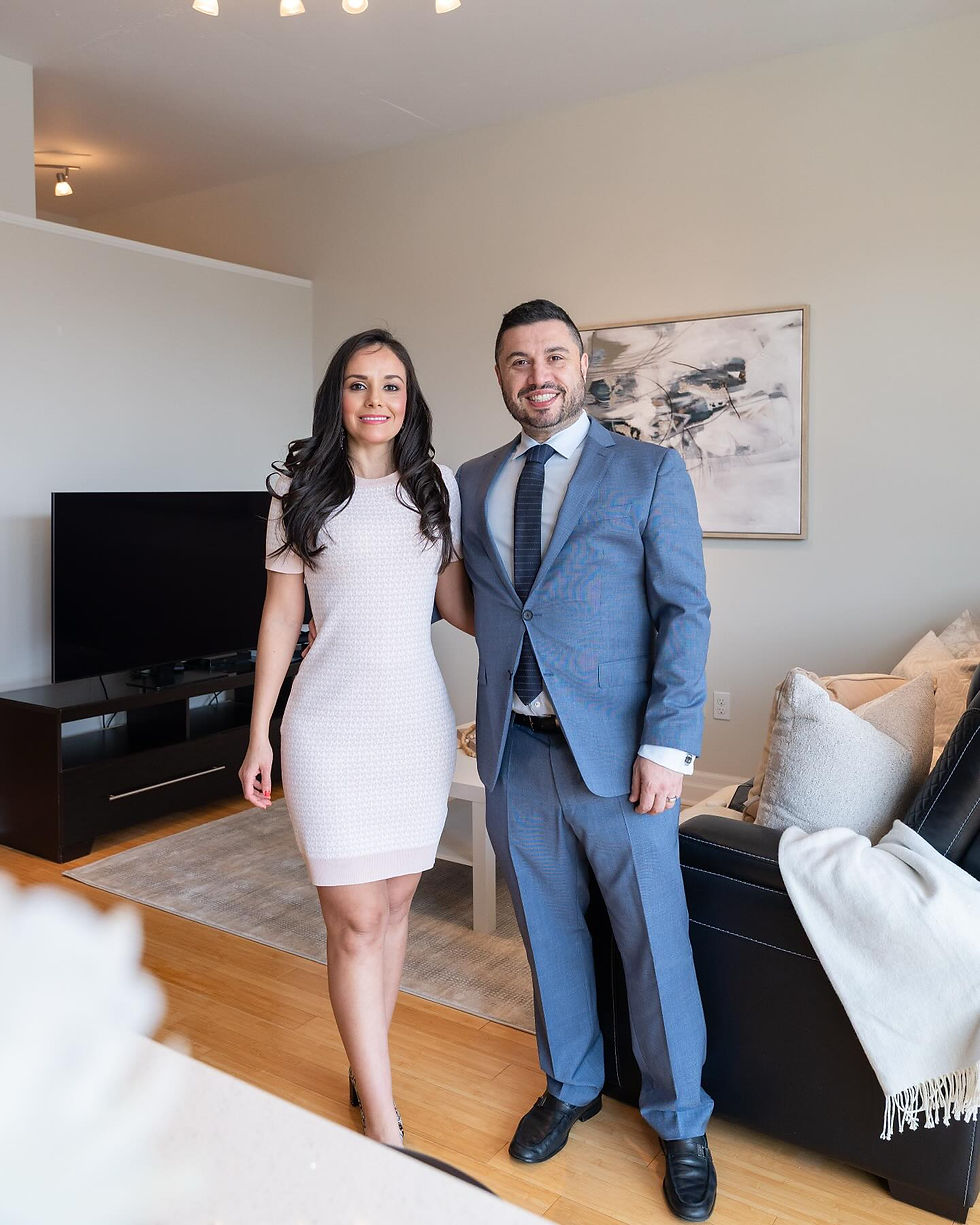The Homebuyer's Roadmap to Touring Properties in Waterloo Region
- Team Pinto

- Feb 26, 2024
- 7 min read
One of the most exciting aspects of the Waterloo Region home-buying process is touring properties for sale. A home tour allows you to see those online listings in person, giving you the best indication of whether or not a home is a good fit for you.
You can see a home in person or take a virtual home tour via video chat. However, seeing the house in person is always preferable.
But any home tour should involve more than just moving from room to room and listening to an agent's sales pitch. There are things that every tour should involve, from a buyer's perspective, that will make it the useful home buying tool it should be. And those are the things we are going to take a closer look at here today.
The Difference Between an Open House and a Private Home Tour Explained

Waterloo Region homebuyers often begin their journey by attending open houses. An open house is a public, often informal event organized by the listing agent that allows anyone to explore the home for sale at their leisure.
The majority of open houses are held on Saturday and Sunday, and last for the most of the day. Open houses are a terrific way to casually tour a home with your Waterloo Region real estate agent or on your own.
However, because they are open to the public, you will rarely be able to see the residence in its entirety and get the kind of in-depth look you need if you are seriously considering the property as a possibility. You'll want to schedule a follow-up private tour with your real estate agent if you want to spend more time taking comprehensive measurements and inspecting every square inch.
How to Prepare for a Home Tour

Do some online research before you start seeing homes to narrow down your list of must-haves against nice-to-haves. Then tell your agent to look for houses in your price range to tour. One of the many good things about working with a buyer's agent is that they will do all the legwork involved in finding suitable properties to show you, and making the arrangements to do so. All you will need to do is show up at the appointed time.
Here are some things to think about even before you go house hunting and begin touring properties and then once you do.
Research the Neighbourhood
Take a few minutes to look around the neighbourhood before your home tour. What is your impression of the neighborhood? Is it crowded or peaceful? Is there any nearby stores, restaurants, or other amenities? How are the schools?
Later, if you're thinking about putting an offer on the house, you should conduct some extra research online and ask your realtor about the neighbourhood. Examine the school rankings, Walk Score of the house, and inquire about the neighborhood with your agent. A local real estate agent will usually be able to provide plenty of 'insider' information that online sources simply cannot.
Floorplan, Number of Rooms, and Room Sizes

Do you prefer an open layout or do you like the differentiation between rooms in a house that doors provide?
As you’re touring homes, it’s important to think about the functionality of the home’s floorplan and layout, and if it will accommodate your lifestyle.
You’ll likely determine how many bedrooms you’re looking for before you begin touring homes, but don’t forget to note the size of the rooms when you start viewing houses in person.
While you might technically know what the square footage of a room is before you see it, what that really means in terms of functional living space can be hard to get a true sense of until you see the space in person.
Will the bedrooms be large enough for your kids as they get older? Will it be spacious enough to accommodate a home office? While the number of rooms is important, so is the square footage of each room.
Natural Light and Home Direction
If having plenty of natural light is a must-have for you, keep track as you tour the home of how much light each room receives. Is the house facing north or south? A property that faces south will receive the most sunlight throughout the day.
For a home that you give serious consideration, touring it at different times of the day may also be helpful in determining how much light each space really gets.
Style and Age of the Home

Have you narrowed down the style of home you want? From craftsman-style houses to mid-century modern homes, there are many home styles in the Waterloo Region to choose from. By browsing listings online, you’ll be able to get an idea of what home style(s) you’re most drawn to which can also help narrow down your search.
Would you rather buy a move-in-ready turnkey home? Or are you looking for an older home to restore or upgrade with minimal improvements? If you're thinking about buying an older property, you'll want to take extra safeguards before making an offer.
Outdoor Features
Last but not least, you should have a general notion of what you want from your outside space. Are you looking for a big, open yard? Are you looking for a pool or enough space to install one in your backyard? Or are you hoping for a smaller patio area that allows you to relax outside without the hassle of maintaining a large yard?
House Tour Checklist

Once inside a home, try everything. Follow common courtesy but don’t be shy—open and shut the cupboards, flush the toilets, and whip out the measuring tape. Pay attention to stairways especially. Are the stairs comfortable to go up and down? Is there a rail? Are there any squeaks in the stairs or do they feel sturdy? Are there any turns or will the width be an issue when moving furniture? Here are a few key things to look for on each Waterloo Region home tour:
Architectural style
Number, location, and size of bedrooms
Number, location, and size of bathrooms
Closet and storage space
Number of floors
Sightlines throughout the home
General floorplan
Age and condition of appliances
Light switches and number of sockets in each room
Plumbing and water pressure
Amount of natural light and views, if any
Noise levels outside the home
Width and types of stairways
Porches and decks
Garage and/or parking capacity
Proximity to neighbouring homes
Remodeling opportunities
Condition of roof and gutters
Cracks in foundation and driveway
Overgrown trees that could cause your home damage
Signs of water damage
Wall and floor conditions such as uneven flooring, chips, or miss-matched flooring
The age of the electrical box
How the home is heated and cooled (i.e. oil, gas, electric)
Possible pest infestation or other visible damage
Don’t Forget about the Exterior
Don’t forget to walk around the entire home and property. Pay attention to the age and condition of the roof and siding. Does the landscaping look like it will be a lot of work? If you don’t have a green thumb and don’t want to hire a gardener every month, you may want to look for a home with easy outdoor upkeep.
Take Notes and Photos Throughout the Home Tour
It’s easy to get homes mixed up so take photos, videos, and notes on each tour. Take pictures of features you particularly like and dislike about each home, and share these insights with your agent. Looking through your photos and notes with fresh eyes may also trigger additional questions you have about the home.
Question to Ask Your Agent

When viewing a home in the Waterloo Region, it's crucial to ask your real estate agent specific questions to understand the property better. Here are some key questions:
What are the unique qualities of this home? – Ask about distinctive features or selling points.
Are there any noticeable flaws or potential issues? – Get insights into any defects that might not be immediately apparent.
How does the price compare to similar homes in the area? – Understand the home's value in the current market.
What's the history of maintenance or repairs? – Inquire about past work done on the home.
How long has the property been on the market? – This can indicate potential negotiation room.
Are there any zoning or development changes in the area? – This impacts future property value.
What are the monthly utility and maintenance costs? – Helps in budgeting beyond the purchase price.
What's the neighborhood like? – Ask about amenities, schools, safety, and community vibe.
Are there any included appliances or fixtures? – Clarify what comes with the house.
Is there flexibility in the closing date? – Important for your moving plans.
Remember, your agent is there to help, so don't hesitate to ask these questions to get a even more comprehensive view of the property.
Red Flags on Home Tours

While you should be looking for home features that check off your boxes, you should also be looking for red flags as you tour a house. These are a few potential red flags you should be aware of and pay close attention to during home tours:
Overly-scented rooms – If there’s an overpowering fragrance, this could indicate that the seller is attempting to mask an odor. Be sure to investigate further for signs of pet odor, mildew, and so on.
Water stains and damage – If you notice any water stains, there’s a chance that there’s underlying water damage to the home, which could lead to costly repairs later on. You’ll want to take note of this and point it out during the inspection if you decide to submit an offer.
A lack of maintenance – Be on the lookout for any signs that the homeowner has neglected regular maintenance, such as burnt-out lightbulbs, fading paint, and leaking faucets. If they didn’t upkeep these smaller items, imagine what larger issues have been avoided.
Foundation issues – Are doors and windows difficult to open? Are there any noticeable cracks around doorways or windows? These could be indicators of underlying problems with the foundation.
A sagging ceiling – If you notice the ceiling is sagging, this is an indication that there’s a larger structural problem.
The Bottom Line

Buying a home often involves compromise and patience. It's common to fall for a home at first sight, but remember, this can mean facing competition from other interested buyers. Keep in mind that the journey to finding your ideal home at the right price might include making multiple offers.
It's a process that requires readiness for some challenges along the way. To navigate these challenges and explore your options in the Waterloo Region, Team Pinto is here to offer expert advice and support. Reach out to us for guidance in your home-buying journey.


